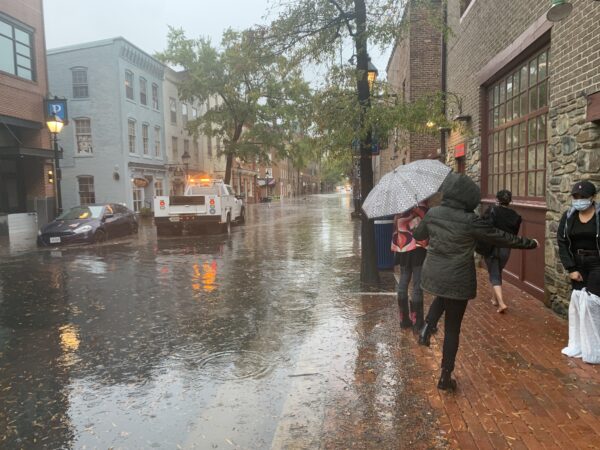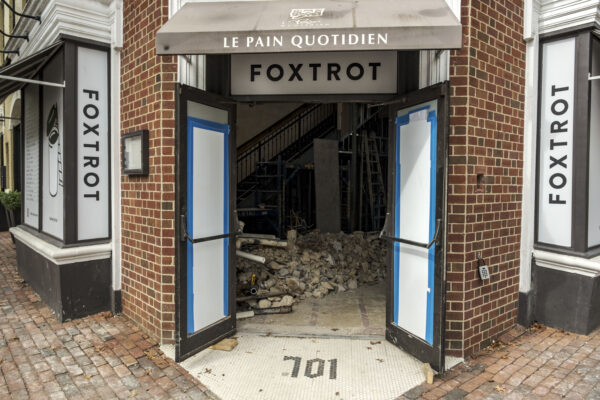Virginia State Sen. Louise Lucas (D-18) says Monumental Sports and Entertainment owner Ted Leonsis can afford to pay for the entire $2 billion Potomac Yard arena project, as well as supporting transportation and other associated infrastructure projects.
“Anything having to do with enriching billionaires, they need to pay for themselves,” Lucas told ALXnow. “They can proffer anything they want to. They can build the arena and make a profit. They could complete the roads and also provide the perennial upkeep.”
Lucas continued, “A lot of people who are doing developments they do proffers and they take care of the roads. They offer to take care of schools, they offer to take care of other things. This is rich people still wanting to get rich without paying for it.”
Lucas said that she was blindsided by news in December that Virginia’s Republican Gov. Glenn Youngkin reached a deal with Monumental Sports and Entertainment owner Ted Leonsis to move the Washington Capitals and Wizards from D.C. to a new arena in Alexandria’s Potomac Yard neighborhood. She said that the deal was presented in such a rush that the legislature didn’t have time to vet the plan, or even thoroughly understand it.
“I mean, all the nuances of a project that major, you need more than a day of somebody telling you this is what we’re doing, we’ve already made the announcement and here we go,” Lucas said.
Lucas is president pro tempore of the Virginia State Senate, and, as chair of the Senate Appropriations Committee, refused to let the approved House version of the arena bill out of her committee and into the state budget, effectively stopping it from landing on the Governor’s desk for approval.
Youngkin held a press conference earlier this month where he called the Senate’s budget a colossal mistake.
“I believe the Senate is about to make a colossal mistake,” Youngkin said. “We came together over many months to represent the very best interests of the Commonwealth of Virginia, and to do it in a way that could put Virginia in the position for a big win in the Commonwealth.”
Youngkin called the arena a one-of-a-kind financial opportunity for Virginia and Alexandria.
“I’m an optimist,” said Youngkin. “A true optimist. I will never stop fighting for Virginia’s success. I believe our Senate and General Assembly have a chance to stand up and do what’s right. They have a chance to assess this one-of-a-kind, first-of-its-kind, opportunity on its merits. It befuddles me that we’re not spending today talking about how to deliver it and we’re instead trying to convince our General Assembly to do what’s right.” Read More
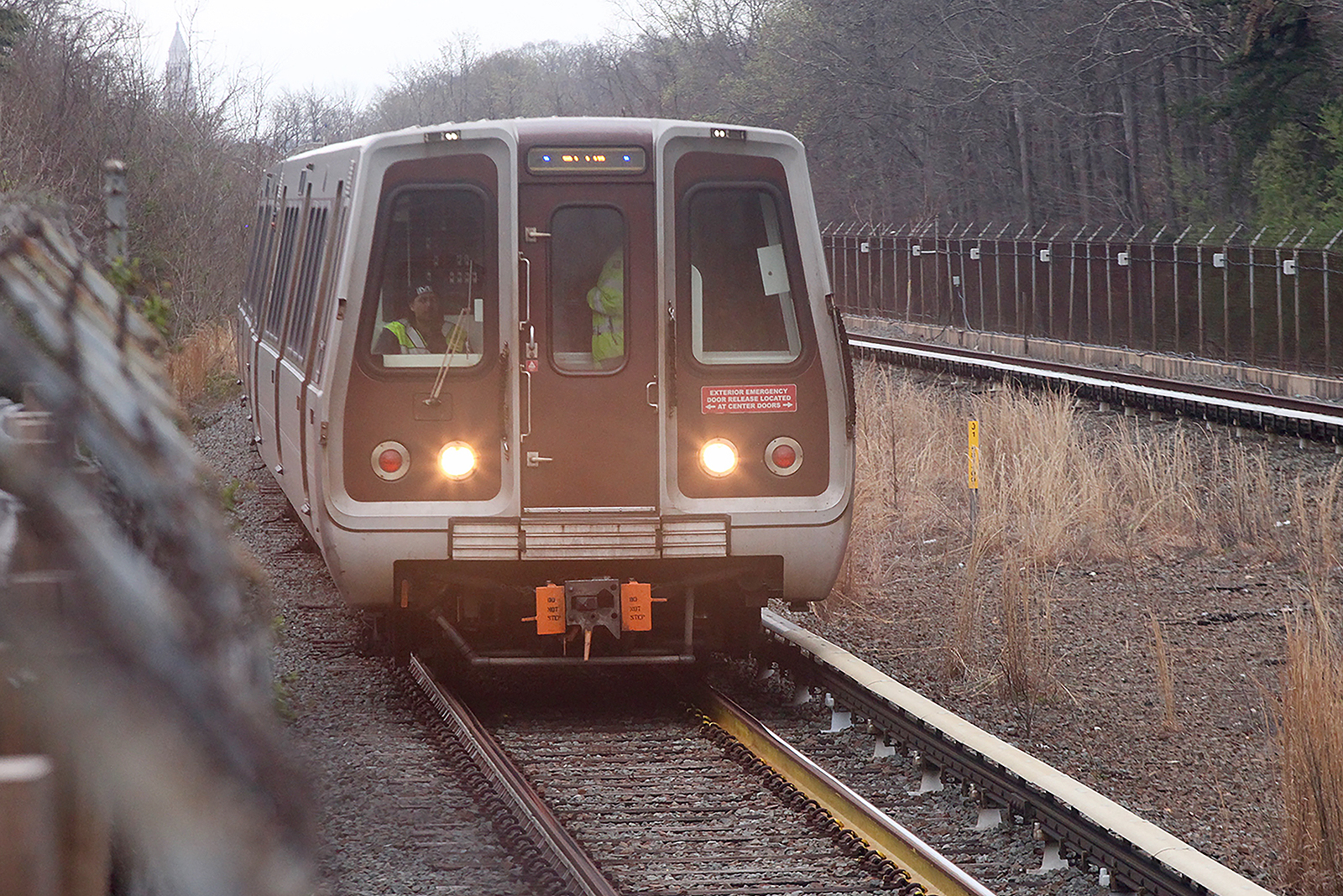
(Updated 9:55 p.m.) Bailing Metro out of its $750 million budget shortfall is going to sting the budgets of localities next year, and the Metropolitan Washington Council of Governments (COG) expects to release a plan addressing it next month.
COG Director Clark Mercer said that the organization’s Chief Administrative Officers (CAO) Committee work group on Metro’s cost structure will release a report next month outlining three options for Metro to consider. One of those options includes a one-time option to use Metro’s preventative maintenance fund against the balance for the next year or two, potentially cutting the shortfall by hundreds of millions of dollars.
“Most transit systems in the country do this on a regular basis,” Mercer told ALXnow. “But what Metro has heard kind of loud and clear is that the region cannot absorb a $750 million bill on top of what they already paid this year. What are some other options? It’s a big, huge mountain to climb.”
Mercer said that Metro CEO Randy Clarke has identified $50 million in ongoing savings from eliminating consultants, as well as nearly $100 million from this year’s budget that will roll over into next year’s budget.
“Just so you know, that fiscal cliff of $750 million, once moving those preventative maintenance dollars up, the next year that cliff is still there,” Mercer said. “It goes down to $300 or $400 million, then up to $750 million again. Those numbers are real.”

COG acts as a regional powerhouse, corralling 24 member jurisdictions (with about six million residents) to get on the same page on regional initiatives like transportation planning, affordable housing, law enforcement and environmental sustainability. Last month, COG released a statement in response to the Washington Metropolitan Area Transit Authority’s financial update.
“Our region’s economy and quality of life depend on a reliable, sustainable Metro system,” stated COG Board of Directors Chair Kate Stewart, who is a Montgomery County Councilmember. “State, local, and federal leaders need to prioritize ensuring we avert the fiscal cliff facing the system and work together to find a long-term, sustainable funding solution.”
The CAO work group, which compiled the report and recommendations, is chaired by Alexandria City Manager Jim Parajon.
COG is made up of about 130 employees, and nearly half of them work in transit with the Transportation Planning Board for the region. Additionally, Metro’s budget has to be approved in the organization’s long-term plan to get federal funding.
Mercer said that not funding Metro by next summer would result in a “transit death spiral.”
“You’re not gonna be able to recruit a company to this region without a well-run Metro system,” he said. “One reason Amazon came where they came was because of Metro, and there are a lot of companies like that.”
Mercer continued, “We can say, ‘We don’t want to fund it, and we want a poorly run Metro,’ and that’s a disaster for the region,” Mercer said. “Option one is a transit death spiral.”
In 2018, jurisdictions in the region agreed to cap their funding to Metro to $500 million, and to increase their allocation no more than 3% every year. Now with Metro’s $750 million shortfall, that 3% needs to be re-baselined with Virginia and Maryland state legislators, Mercer said.
“The second option is to look at the way that Metro is funded — from Richmond, Annapolis, the District of Columbia, and the federal government,” Mercer said. “Ask any business person if they want their budget approved every year by four different boards of directors. Funding options needs to be discussed over the next year.”
Without a funding increase from Alexandria and its neighbors, WMATA reported “unprecedented operating deficits” will force it to make drastic cuts to rail, bus, and paratransit services across the region.

One month after a study found that the Virginia state government is underfunding schools, Alexandria Mayor Justin Wilson called on state leaders in Richmond to reconsider their approach.
The core issue identified by the Joint Legislative Audit and Review Commission is that the Local Composite Index (LCI) incorporates local real property, gross income and taxable retail sales to determine how much a locality can fund their school system.
But that calculation for staffing positions doesn’t account for things like regional labor costs, school division size, or students with higher needs, all of which can be higher in Northern Virginia than other localities.
Wilson said in a newsletter that, based on this formula, many Northern Virginia communities are expected to cover 80% of the cost of their schools. Alexandria City Public Schools (ACPS) receive $63.6 million from the state every year, which amounts to a little less than 20% of the operating costs of the schools, while some localities have 83% of the school budget covered by the state.
Virginia school districts as a whole receive 14% less from the state than the national average compared to what those schools are actually spending, or around $1,900 less per student, according to the Washington Post.
“In Alexandria, we have consistently voiced concerns in Richmond about the LCI as an inappropriate tool given that it puts too much emphasis on the purported wealth of a community and too little emphasis on the costs of services required by the student body,” Wilson wrote. “In the case of Alexandria, with a student body with high levels of poverty, English language learners and special education, the costs of educating our students is not represented by the pockets of wealth in some areas of our City.”
The study found that the current formula does not accurately reflect the local education costs. Wilson said he hopes the General Assembly and Gov. Glenn Youngkin will take steps to address this in the next legislative session.
“Bottom line is that their formula essentially treats Alexandria and Falls Church the same, the school system with one of the highest levels of poverty in the state and the school system with the lowest level of poverty in the state” Wilson told ALXnow. “I don’t think that’s fair to our students or our taxpayers.”

Alexandria City Public Schools says it will not comply with Gov. Glenn Youngkin’s policies restricting transgender services.
School Board Chair Michelle Rief and Superintendent Melanie Kay-Wyatt informed parents of the school system’s stance on Monday. It’s the second straight year that ACPS has refused the policies, which are updated annually and recommend restricting trans bathroom and pronoun use.
Rief and Kay-Wyatt were “dismayed” when the policies were introduced and wrote that ACPS will uphold gender affirming policies that go back to 1996.
“(W)e want to reaffirm our commitment to all students, staff and families, including our LGBTQIA+ community, that ACPS will continue to both implement and develop gender affirming policies for all ACPS students,” they wrote. “School Board Policy JB: Nondiscrimination in Education protects students from discrimination due to gender expression, gender identity, sexual harassment and transgender status.”
The Virginia Department Of Education’s 2023 Model Policies include “clear and useful” suggestions to school systems for preferred pronoun usage, the “maintenance of student records,” the “identification of students,” the “enforcement of sex-based dress codes” and more.
“Practices such as compelling others to use preferred pronouns is premised on the ideological belief that gender is a matter of personal choice or subjective experience, not sex,” according to the model policies. “Virginians reject this belief.”
Not so in Fairfax County and Arlington County, which both rejected the 2023 policies, according to The Washington Post.
Youngkin, a Republican, made waves in 2022 when the Virginia Department of Education first introduced his administration’s model policies, which reversed the more liberally minded policies of former Democrat Gov. Ralph Northam.
Rief and Kay-Wyatt also wrote that the School Board will discuss the policies at the beginning of the school year.
“ACPS will continue to ensure that its policies are in alignment with the ACPS Strategic Plan while also complying with federal and state laws,” they wrote.

The tension between Alexandria’s leaders and Virginia Gov. Glenn Youngkin is not exactly a secret, but there have been a few surprising examples of overlapping policy goals.
Most recently, Mayor Justin Wilson shared vocal support for Youngkin’s new Make Virginia Home plan.
The plan includes a multi-pronged approach to affordable housing, with a focus on:
- Increasing the supply of land for housing: the plan promotes discretionary state grant funding for localities to use for affordable housing. The plan establishes “guard rails” for zoning and land use review processes for localities seeking state assistance, along with requiring transparency in reporting on affordable housing and a comprehensive review of the state’s land use and zoning laws.
- Remove regulatory barriers to housing development: the plan makes it easier for affordable housing to meet certain environmental regulations and streamline the permitting process, along with translating the building regulations into Spanish.
- Align housing development with economic growth: the plan includes housing in economic development planning and site development processes. It also includes goals for establishing public/private partnerships that include workforce housing in site development.
The plan has gotten some support, including praise online across the aisle from Wilson. In particular, Wilson said city staff and affordable housing leadership attended a conference last month where Youngkin outlined potential coordination on affordable housing goals.
“As you noted in your speech, this is a multi-faceted challenge that requires policy coordination across local, state and Federal governments,” Wilson wrote in a letter to Youngkin. “We believe there is considerable opportunity for bipartisan agreement to advance good policy and we want to be partners with your Administration to make this happen.”
Wilson outlined some of the progress Alexandria has made in affordable housing, particularly in the use of private development to fuel public affordable housing.
“Given that success, we strongly support your proposals to strengthen the linkage between housing and economic development,” Wilson said. “As you have noted, employers will not locate jobs in the Commonwealth without the ability to house the workforce required, including new jobs at a range of income levels.”
Wilson also praised the proposals to direct future state funding to the Virginia Department of Housing and Community Development (DHCD) and encouraged investment in the State Housing Opportunity Tax Credit Program and the Virginia Housing Trust Fund.
There was one area of concern about potential punishments for local jurisdictions that fail to meet certain state requirements. According to Wilson:
While we strongly support the provisions of your Plan that will incentivize new housing creation, link economic attraction to housing production, and use state funding as a “carrot” for the adoption of pro-growth land-use policies, we are concerned by proposals that purport to punish local jurisdictions for the diligent exercise of ministerial acts, or proposals that remove local control as a method to accelerate housing creation.
Wilson said piecemeal acts by Richmond to erode local control over land-use processes have had a negative impact on housing creation, and that aspect of the Make Virginia Home plan would only reinforce that problem.
“We would instead suggest more comprehensive reform to expand local capabilities to manage the externalities of development, while providing robust incentives for the adoption of pro-growth land-use policies,” Wilson wrote. “This will not only accelerate housing creation, including enhanced housing affordability and accessibility, but also maintain the critical public support required to sustain these policies over time.”
The @GovernorVA has presented a housing plan that has some good ideas.
If the Commonwealth can work WITH local governments to create the housing supply necessary to support a growing Virginia, there is a real opportunity for bipartisan progress. pic.twitter.com/mS8rRISlrx
— Justin Wilson (@justindotnet) December 16, 2022
Despite the political divide between the Republican Youngkin and the largely-Democratic Alexandria, there have been areas of overlap between local goals and state leadership. Early in Youngkin’s campaign, Wilson expressed enthusiasm for Youngkin’s goals of holding Dominion Energy more accountable and state officials appointed by Youngkin have worked with Alexandria’s local and federal representatives on infrastructure funding.
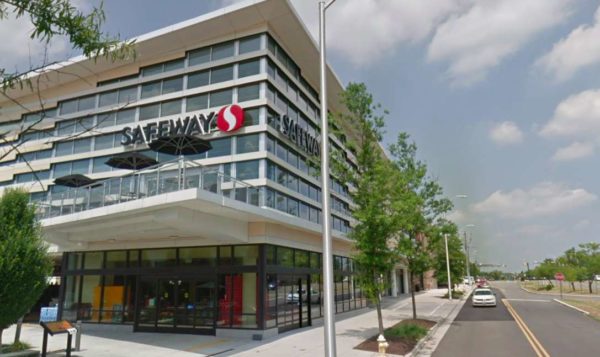
(Updated 8 p.m.) Virginia Governor Glenn Youngkin is scheduled to visit an Alexandria Safeway (3526 King Street) today to discuss efforts the Governor’s office said aims to reduce the cost of living.
“Governor Glenn Youngkin will visit a grocery store in Alexandria, Virginia today,” Youngkin’s office said in a press release. “The governor will discuss the elimination of the grocery tax, the rising costs of groceries, and the impacts of inflation on Virginia families and the high cost of living.”
Virginia collects $500 million in grocery taxes, but the tax has been unpopular with both Democrats and Republicans, with both Youngkin and last year’s Democratic candidate Terry McAuliffe expressing support for eliminating the tax.
Youngkin will participate in a roundtable discussion with parents and tour the store at noon.
Photo via Google Maps
Last week, Gov. Ralph Northam’s office announced a new batch of flood prevention grants, and this time around Alexandria’s getting more than the pocket change it did the last time around.
Two Alexandria projects were featured in the new round of funding, with one project design, in particular, getting a major boost.
The state is allocating $3.2 million to Waterfront Improvement Project design. The city has been working through various potential designs for flood mitigation along the waterfront, but leadership balked at the cost and sent plans back to the drawing board. Even the least expensive option came in at an estimated $90 million for flood mitigation alone.
The state’s $3 million is allocated toward design, which the Waterfront Commission said will have to incorporate more elements of the waterfront plan beyond just flooding mitigation. Earlier plans for waterfront flood mitigation were also noted as doing little to prevent tidal flooding, such as the one in October that shut down several blocks of Old Town.
The city is also getting some funding for flood mitigation in Arlandria. The state allocated $516,500 for the Edison Street and Dale Street capacity project, which aims to help with flood mitigation near the Cora Kelly School for Math, Science and Technology.
Mayoral candidates engage in public forum — “Alexandria’s mayoral candidates gathered in a virtual forum on Saturday, kicking into high gear to get their message out ahead of the Nov. 2 general election.” [Alexandria Times]
Amazon backs grant program to spur affordable development near D.C.-area transit — “Amazon will fund a new grant program to help local governments and nonprofit developers pursue affordable projects near transit stations, directing $500,000 of its recently announced $2 billion Housing Equity Fund to this effort.” [Washington Business Journal]
Local group plans Four Mile Run clean-up — “Join us Sat., Oct. 23 for cleanup at Four Mile Run Park from 9 a.m. to 11 a.m. to celebrate the Clean Virginia Waterways and Ocean Conservancy’s International Coastal Cleanup.” [Twitter]
Alexandria kid goes viral for love of fire department — “Alotta yuck these days… Please enjoy the delight of my three year old spotting a fire truck. @AlexandriaVAFD, meet your biggest fan!” [Twitter]
D.C. didn’t ask Northam and Hogan to help crack down on ticket scofflaws, despite initial claims it did — “D.C. Mayor Muriel Bowser never reached out to the governors of Virginia and Maryland to negotiate reciprocity for automated traffic camera tickets, despite a District government report — signed by the mayor and submitted to the D.C. Council last week — saying that said she did.” [DCist]
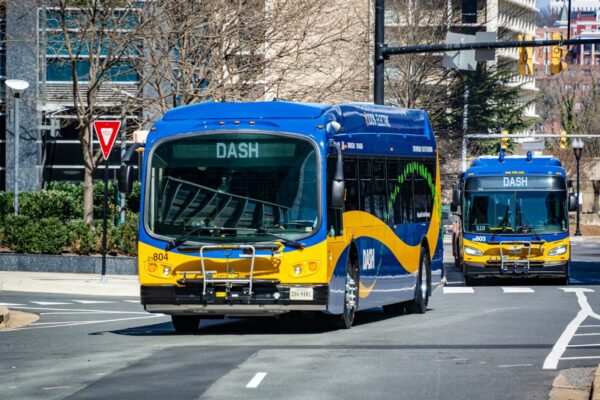
The city’s DASH bus network recently went fare-free, and the city is looking for more funding from the state to help it stay that way.
An item at the upcoming Tuesday, Sept. 14, City Council meeting includes an application to the Transit Ridership Incentive Program (TRIP) to help finance the city’s free bus ridership program.
The application has already been supported by the DASH Board of Directors. According to the docket item, the city is planning to submit an application of funds up to $8 million over the next four years. In the report, city staff said they expect to be awarded a maximum of $7.2 million through TRIP with the city committing $9.83 million in local funding between FY 2023 and FY 2025 to operate DASH fare-free, in addition to $1.47 committed in FY 2022.
The city isn’t alone in this. The application notes that $12.5 million in TRIP funding goes to subsidized fare or zero fare programs.
Photo via DASH/Facebook

Alexandria will likely be getting an influx of funding from a statewide opioids settlement, but how much and where exactly that funding will be going remains to be determined.
The City Council met last night for a special session — interrupting the brief summer break due to the need to have a decision the city should join the Virginia Opioid Abatement Fund and Settlement Allocation Memorandum.
City attorney Joanna Anderson said the city previously filed litigation opioid companies and the decision is likely coming to a settlement at a statewide level.
Anderson also said the precautions are being taken at a state and local level to handle distribution of funding from settlements better than in the past.
“We’re having discussions with Attorney General’s office,” Anderson said. “We think this is a fair way for funds to come down. [This will be] handled better than previous settlements, like tobacco settlement. This agreement represents localities better. We think this is a fair process to do this.”
City Manager Mark Jinks said that currently it is unknown how much money the city will get and where that funding is going once it gets here.
“At this point, there’s been no decision on how to allocate funds,” Jinks said. “That will probably be part of annual budget process. It doesn’t have to be allocated to any one organization. We have an opioid work group and coordinator… and we will be looking for what’s the best application of money — at what’s the highest need.”
Photo courtesy Michael Longmire/Unsplash


